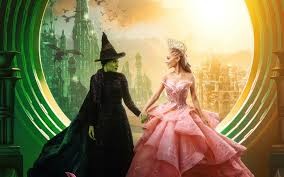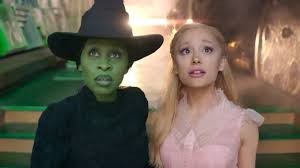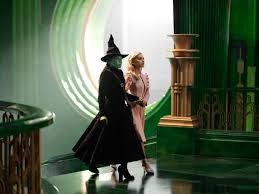Wicked, based on the novel by Gregory Maguire, transports audiences to a world where the stories of familiar characters are reimagined. It takes the classic tale from L. Frank Baum's "The Wonderful Wizard of Oz" and flips it on its head, telling the backstory of the witches in Oz. Since its Broadway debut in 2003, this musical has continued captivating audiences with its rich storytelling and powerful themes, making it a cultural phenomenon.
The Origin of Wicked: A Novel's Transformation
The roots of Wicked can be traced back to Gregory Maguire's novel published in 1995. The book explores the lives of Elphaba, the Wicked Witch of the West, and Glinda, the Good Witch, providing depth and nuance to these iconic characters. Maguire's narrative delves into themes such as friendship, identity, and the interplay of good and evil, setting a rich foundation for adaptations in various formats.
The Creative Minds Behind the Musical
The musical adaptation of Wicked was crafted by the esteemed duo of composer Stephen Schwartz and librettist Winnie Holzman. Schwartz, known for his previous works such as Godspell and Pippin, brought his magical touch to the score, infusing it with both whimsy and emotional depth. Holzman skillfully transformed the novel's intricate narrative into a cohesive script that resonates with audiences of all ages.
Character Dynamics: Elphaba and Glinda
At the heart of Wicked lies the complex relationship between Elphaba and Glinda. Elphaba, born with green skin, represents the misunderstood and marginalized figure. In contrast, Glinda embodies the societal norms and expectations of beauty. Their journey from roommates at Shiz University to rivals and eventually to friends is central to the story. This dynamic is a poignant exploration of how friendship can evolve under the pressures of ambition and societal expectations.
The Music: A Melodic Journey
Wicked's score is a standout feature of the musical, with songs that have become anthems of empowerment and self-discovery. "Defying Gravity," the musical's signature number, showcases Elphaba's resolve to embrace her identity despite the judgments she faces. The emotional weight carried by the melodies and lyrics makes them memorable and relatable, further enhancing the story's themes.
Unchecked Ambition: The Theme of Power
One of the prominent themes in Wicked is the examination of power and the consequences of ambition. Characters like the Wizard manipulate those around them, reflecting the dark side of ambition. Elphaba's journey underscores the challenge of using one’s power for good, highlighting the complexities of morality within a society that often misconstrues intentions.
The Color Green: Symbolism and Representation
The color green, representing Elphaba, is emblematic throughout the musical. It symbolizes her outsider status and the misconception of her character. The choice of green can be interpreted in various ways, from envy to individuality, contributing to the layered storytelling that Wicked is known for. This symbolism resonates with audiences as it explores the nuances of representation and acceptance.
Staging and Visual Aesthetic
The production design of Wicked is nothing short of breathtaking. From the grandiose set pieces that depict the Land of Oz to the intricate costumes that signify each character's personality, visual elements play a crucial role in immersing the audience in this fantastical world. The use of lighting enhances the magical quality of the performance, making every scene captivating.
Cultural Impact: A Global Phenomenon
Since its inception, Wicked has achieved critical acclaim and commercial success, leading to numerous international productions. It has sparked a global fan base, with various adaptations including touring productions, licensed performances, and even a forthcoming film adaptation. The musical's impact extends beyond the stage, influencing fashion, pop culture, and even social movements that embrace its themes of acceptance and defiance.
The Role of Female Empowerment
Wicked stands out for its strong female lead characters, offering a narrative that emphasizes female empowerment. Elphaba and Glinda break traditional molds, showcasing independent thoughts and complex emotions. Their journeys embody the struggles women face in a patriarchal society, making the story resonate with contemporary audiences seeking representation and strength in female narratives.
Fan Culture and Community
The fandom surrounding Wicked is vibrant and dedicated. Fans gather at conventions, participate in online discussions, and create fan art as expressions of their love for the story and its characters. This community cultivates a feeling of connection and mutual respect for the values of love, friendship, and uniqueness, highlighting how storytelling can bring people together.
Anticipating the Film Adaptation
With a film adaptation in the works, expectations surrounding Wicked have surged. Movie adaptations of beloved musicals can stir anticipation and skepticism, but the iconic nature of Wicked's story and music provides a solid foundation for this transition. Fans await to see how the film will interpret the rich narrative and visually stunning elements of the stage production.
Challenges Faced by the Production
Despite its success, Wicked has faced its share of challenges. The initial production encountered skepticism over its unconventional storyline and length. However, through perseverance and creative adaptation, the team succeeded in delivering a groundbreaking theatrical experience that has stood the test of time. The evolving perception of the musical is a testament to the power of storytelling and art.
Legacy and Future Adaptations
The legacy of Wicked will undoubtedly endure. Its core messages about acceptance, individuality, and the complexities of identity continue to resonate with new generations. The anticipation of potential sequels or additional adaptations keeps the conversation alive. As audiences hope for new stories set in the Land of Oz, Wicked remains a beloved cornerstone of musical theater.
Conclusion: The Magic of Wicked
Wicked is more than just a musical; it is a celebration of individuality and the exploration of complex themes such as friendship, ambition, and societal constructs. Through its captivating story, powerful music, and memorable characters, it invites audiences to challenge preconceived notions about good and evil. As Wicked continues to enchant and enthrall audiences globally, its impact on culture and theater remains profound and everlasting.













